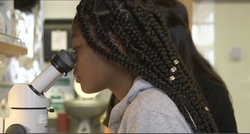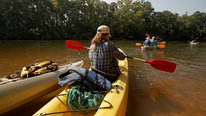May 2023: Broadening Participation in STEM by Focusing on Identity Development

Theme's playlist
Expert Panel

May Expert Panel: Broadening Participation in STEM by Focusing on Identity Development
Recorded: May 2, 2023 at 3:00pm EDT
Description:This month’s webinar will focus on identity development and its importance and relationship to persistence in STEM for underrepresented minorities. The projects highlighted will address challenges and barriers to identity development, illuminate best practices and disseminate impacts to advance the body of work in this area. We look forward to your participation!
Join the Discussion! View Recording & Bios
Discussion
Read the discussion related to this theme.Related Resources
This research seeks to understand the experiences of African American female undergraduates in STEM. It investigates how familial factors and science identity formation characteristics influence persistence in STEM while considering the duality of African American women’s status in society.
This study was conducted in response to the growing concern about the lack of U.S. students majoring in STEM fields and pursuing STEM careers. In order for the U.S to compete in a global economy that is increasingly technologically-based, a skilled STEM workforce is a necessity. Understanding the factors that encourage confidence in science and intent to pursue science related careers remains a national mandate.
acially minoritized students in the United States constitute 30% of the U.S. population, but students from these populations represent a smaller proportion of those who earn STEM undergraduate degrees. This disproportionality contributes to race/ethnic income, status, and power inequalities linked to STEM careers. Using a combination of vote counting and narrative approaches, the authors synthesize 50 recent articles about the factors related to college students’ STEM participation.
This article investigates the persistent challenge of how higher education institutions can support the success of underrepresented minority (URM) women in science, technology, engineering, and mathematics (STEM) fields. Our theoretical model centers on intersectionality, and we examine the possibilities and challenges involved in taking an intersectional approach to institutional change for this group. Our NSF-funded study focused on 18 universities that received large NSF ADVANCE Institutional Transformation (IT) grants.
This infographic poster of the NSF Emerge Program in partnership with the Society for Freshwater Science website and poster.
Last year, the White House held a summit announcing the launch of the STEMM Opportunity Alliance, the initiative to ensure STEMM equity by 2050. SOA is uniquely positioned to answer the Administration’s call and bring about fundamental, systemic change.
SEA Change aims to advance institutional transformation in support of diversity, equity, and inclusion, especially in colleges and universities. SEA Change is a comprehensive initiative from AAAS that implements a proven self-assessment process to effect sustainable change with regard to diversity, equity, and inclusion in STEMM at U.S. institutions of higher education.
The American Museum of Natural History is engaged in a 10-year longitudinal study examining the experiences and pathways of over 350 NYC youth from backgrounds historically excluded in STEM who have participated in mentored science research experiences as part of the NYCSRMC. The study traces youth trajectories from their participation in a high school out-of-school science research mentoring program through college and into the first years of their careers.
The purpose of this action agenda is to identify research questions and creative solutions for the longitudinal tracking of, and measurement of outcomes for, participants in girl-focused STEM programs.
In this article, we nuance and complicate the push for data literacy in STEM reform efforts targeting youth of color. We explore a curricular reform project that integrated explicit attention to issues pertaining to the collection, analysis, interpretation, representation, visualization, and communication of data in an introductory computer science class.
Science in the City examines how language and culture matter for effective science teaching. Author Bryan A. Brown argues that, given the realities of our multilingual and multicultural society, teachers must truly understand how issues of culture intersect with the fundamental principles of learning. This book links an exploration of contemporary research on urban science teaching to a more generative instructional approach in which students develop mastery by discussing science in culturally meaningful ways.







Sonia Duffau
Hi, Sonia here, so happy to participate, thanks for listening and offering a hand with the projects :)
Gabriele Haynes
Thanks for the lively conversation today and looking forward to continuing it here.
Claire Duggan
Gabriele, I would love to connect directly. Best email to reach you at? Claire c.duggan@northeastern.edu
Leighanna Hinojosa
I appreciate the panel members and community members today and enjoyed hearing about the amazing work being done to promote equity in STEM!
Claire Duggan
Great session today. Thank you. I look forward to continuing our discussion. Claire Duggan c.duggan@northeastern.edu
Co-PI for the NSF Includes Engineering PLUS Alliance https://engplusalliance.northeastern.edu/academy/ and lead for our stEm PEER Academy.
Sonia Duffau
If you want to see what we do you can find us here: https://stemforall2021.videohall.com/presentati... we concentrate in women in STEM and on "soft skills" as our tool to help support them. We believe the change will come with whole society involvement and we propose that we cannot do it all ourselves but maybe we can engage other institution into using our resources and ideas for free and multiply the reach by getting others to work with and improve on our efforts :)
Lynda Kennedy
Such a great discussion - I hope all the resources from our breakout group end up here - here was one I posted: https://www.intrepidmuseum.org/education/images...
Pei Zhang
It's a great meeting and discussion today. As a public high school STEM class education material ( Biological Battery etc)/curriculum developer, we are looking forward for potential collaboration.
Iris Wagstaff
Thanks so much to you all for joining us in today's webinar! We look forward to continuing this discussion the role that identity plays in broadening participation in STEM over the next two weeks. Feel free to share resources and pose questions we may not have addressed. Some AAAS resources that may be useful are: STEMM Opportunity Alliance - https://stemmopportunity.org/, SEA Change - https://seachange.aaas.org/, and S-STEM REC - https://sstemrec.aaas.org/
Preeti Gupta
Hello everyone, So great to see so many people on the Webinar and to get a chance to hear from several of you in the breakout room.
Wanted to share a website that provides more detail about the Staying in Science longitudinal study.
https://www.studentresearchnyc.org/research-ite...
Daniel McGarvey
Hi Folks. That was a great session today. A fun one, too! Just let me know if you'd like some more granular information on Emerge.
Also, keep in mind that we have an AWESOME program website! Lots of info on our Leadership Team, the Participants, past conferences and workshops, etc. Plus lots of pics!
www.sfsemerge.org/
Kathryn Hobbs
Thanks to all who joined us for yesterday’s panel. We have posted a collection of the resources shared in our Resources for this month’s theme here: https://multiplex.videohall.com/month_themes/26#resources
Jeremy Foutz